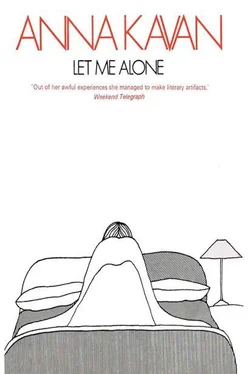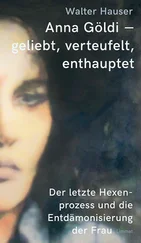‘How? — well — I don’t know how.’ She stared gravely at Sidney. ‘But you could have done it. Just as you could still prevent my going to the East — even now — if you wanted to.’
Sidney said nothing. She seemed to be reflecting. Suddenly she made the slightest movement with her hand, her eyelids fell once, and lifted, flickering, over her bright eyes. Anna’s heart bounded in her breast. She almost woke out of her numbness. Then Sidney stiffened again. She seemed to close up again in stiffness. Her face went neutral and blank. But in her eyes, which had changed slightly, there was a glaze of finality. She had decided against Anna. Anna knew it. And her heart fell back numb as her hope left her. The numbness took possession of her heart, and left her without power or animation, hopeless.
‘But you don’t want — do you?’ she murmured involuntarily, hopeless, like a condemned person. A faint, sick smile came from somewhere to the corners of her mouth.
Her face was pale and submissive, with a strange, painful acquiescence, as though the will had been destroyed in her. So she looked at Sidney, as if hypnotized. There was the slight smile on her mouth. Sidney frowned darkly, with black brows. She leaned a little to Anna; but her spirit held back, relentless.
‘It’s too late now — isn’t it?’ she said, in a voice that made Anna tremble.
‘Too late!’ Anna repeated, with narrowing eyes. She gave a curious laugh, almost of derision. ‘Yes. I’ll go away.’
But as she moved, with her face averted, to go out of the shed: as she passed in front of Sidney: Sidney moved too, in her farm-boy’s smock, and followed her. Anna brushed through the webs of sunshine, under the trees. At the edge of the spinney, near the lane, was a gate which she must pass. Here she paused, hesitating, and Sidney paused beside her.
Anna found nothing to say. She stood abstracted, looking downwards at the yellow leaves spangling the ground.
‘Good-bye,’ said Sidney, with her mannish intonation. ‘Good-bye, Anna-Marie. I’m sorry — sorry! But you’re the one responsible. You’ve made things go this way.’ She smiled a thin, subtle smile, like a wild creature’s, but inexpressibly wistful. The old wild, shy charm was still alive in her, attractive, so attractive, in spite of the coarsening smock. Her slouching, animal grace made Anna tremble, under the numbness.
‘Good-bye,’ whispered Anna, smiling a little. But she was quite hopeless.
Numb and mesmerized she felt: there was no strength in her. What refuge was left when Sidney repudiated her! Sidney had been her last hope, her ultimate tower of strength. Sidney had abandoned her. Where could she go? What should she do? She was as if destitute. And for her destitution there could be no relief. Hopeless! She did not know where to turn, how to behave. She was quite numb, quite without any will, resigned to her fate. She knew her fate was sealed. Only she felt lost, like a small, helpless animal, astray in the world. There was no strength in her.
ANNA wept as she walked away from Sidney, through the deserted village, past the inn with the wrought-iron sign. How dismal the place had become! She was cold and tired. The sun was almost gone. The hills crouched like animals, dark and unfriendly, the sky had a bleak, forbidding emptiness, the very houses looked desolate. She wished she could cease to exist.
And in a way, her existence had come to an end. She felt so numb, so aimless. What was she to do? The world seemed vast and dreary. And there was no place for her in it. Of what avail to go hastening from point to point across the surface of the world, when everywhere was the same dreariness, the same vacancy! She thought of Matthew, and it seemed like the thought of some strange nonentity, not of a man at all. She thought of Blue Hills, and of River House, and a distant shudder went through her blood, under the chilly numbness.
She could not bear to think of the world in which she must live. She could not bear to think of going back to Matthew, or to Lauretta, or even to London. She could not believe that she would be obliged to do one of these things.
Nevertheless, it was necessary to make a move in some direction.
A train arrived, after a long wait, and carried her away — whither was quite unimportant. With the surface of her mind she knew the train’s destination, knew that she would have to change at such and such a station. But the knowledge was quite external: she did not appreciate it.
She sat quite motionless in the cold, empty carriage, her hands clasped together on her lap. On her face was a grave, thoughtful look. But she continued to be at a loss. She continued to feel dazed, as though she could not appreciate her circumstances. The cold numbness was upon her, like a prolonged hypnosis. And through this deadening heaviness she perceived vaguely the moving countryside, the coming and going of stations, the figures of men like trees walking.
Then suddenly she woke up. With one gesture she threw off the numbness, some sort of feeling came back to her. She realized that she had been in the train a long time. She wanted to get out of the train. She wanted to come back to life.
A station was approaching. She looked out of the window and saw that it was Oxford.
In a flourish of renewed vitality she collected her things and descended to the cold, noisy, lighted platform. Darkness had quite fallen. Possibly it was late. The lights appeared flaring and unsteady.
All was now simple and straightforward to Anna. It was night, a brightly-lighted Oxford, and stars frostily shining, and people going about the streets. She took a taxi and drove through the frequented streets in the lamplight, and was deposited at Catherine’s abode.
And the first person to open the door was Catherine, with a dark cloak over her evening dress. She was just going out somewhere, and had a brilliant, by-gone look. Like a beauty of some by-gone century she looked, in her long, dark velvet cloak with a gold gleam beneath. Her large, heavy eyes were dilated, staring at Anna. Her mouth made a scarlet, crooked line on her face. Her skin was cleverly painted, and she was really brilliant, in a dashing, slightly disreputable, masquerading style. Some of the artificiality and the decorative recklessness of old Venice about her; and also the modern defiant hardness. She greeted Anna effusively and put her arm round her, there in the cold street, speaking in a clear, penetrating voice that made people look round. A young man who seemed to be with her watched without surprise.
‘I’ve just been thinking about you; and now you appear on my doorstep. Anna-Marie, you amazing person! What are you doing here? You must come to the party with me!’ cried Catherine, and her eyes flashed in the darkness.
‘I’ve no clothes with me.’
‘You shall wear one of my dresses, Annik.’
‘Are you sure you want me? Do you want me to come?’
‘Yes, Annik, you must come. I want you.’
‘Do you really — really?’ said Anna. But she was already inside, she followed Catherine up the stairs into her room.
‘Choose your dress. Choose!’ cried Catherine, throwing dresses on to the bed. Anna looked on in bewilderment till she became still again. Then the two girls laughed.
‘How attractive you are!’ said Catherine, with a sudden seriousness, standing in front of Anna. ‘You make me think of Byron as a young man. My clothes are not severe enough for you.’ She turned over the dresses abstractedly, considering.
Anna felt rather strange in the presence of this brilliant girl, bewildered, as if she were in the wrong element. She was not used to this unconventional behaviour. But she was flattered.
Читать дальше












